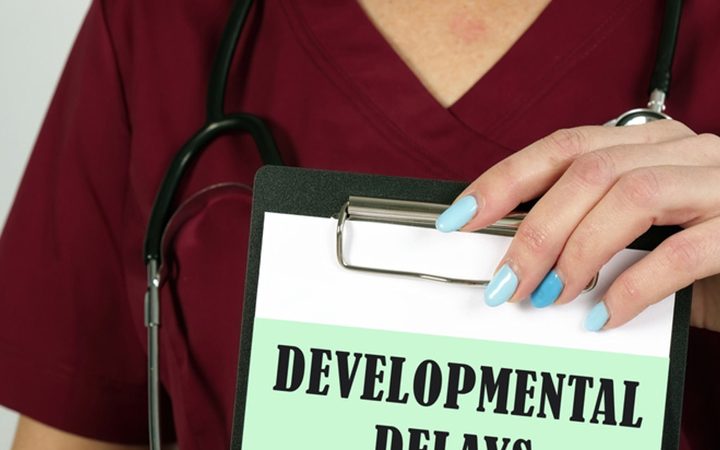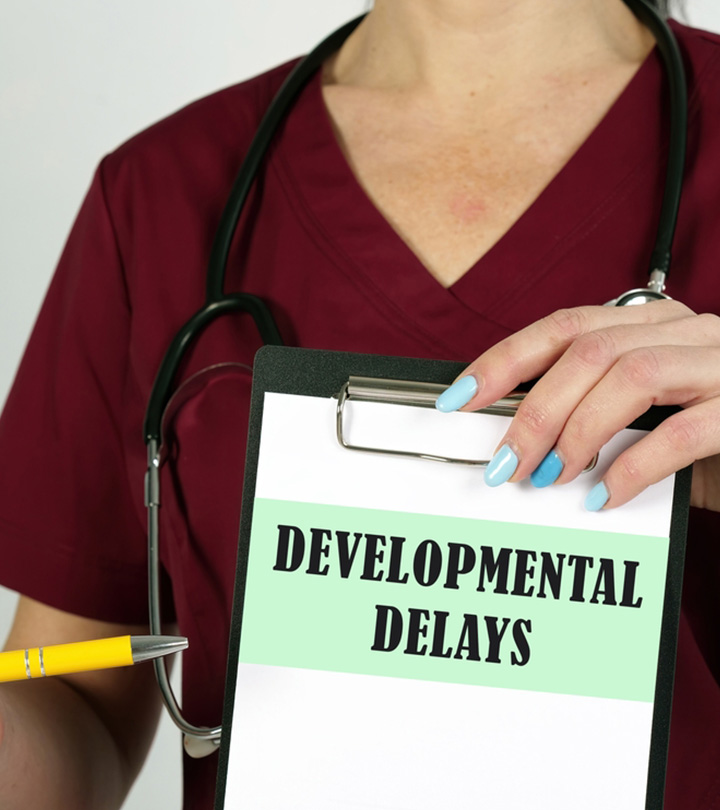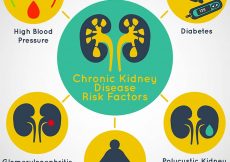Developmental delay is when children take longer to reach developmental milestones (age-specific skills) than expected of their age. That said, each child is unique, and a little delay in attaining milestones is not a reason to worry (1).
However, if children are continuously lagging in their movement, communication, behavior, and thinking and learning abilities, it might indicate an underlying problem. If the developmental delay is long-term, it might be called a developmental disability, such as intellectual disability or cerebral palsy (2).
In this post, we discuss the types, causes, symptoms, diagnoses, and ways to help a child with developmental delay.
What Are The Types Of Developmental Delay In Children?
Developmental delays occur in five areas. When a child shows delay in more than one development area, it is known as global developmental delay. The types of developmental delays are:
1. Cognitive delay: Cognitive delay may affect the intellectual function of children, causing a decline in their ability to think, learn, and solve problems. The condition may also cause learning difficulties, which become evident when children start going to school (3) (4) (5) (6).
Causes of cognitive delay
Signs of cognitive delay
- Delay in sitting, crawling, or walking
- Speech delays
- Inability to pay attention for long
- Memory problems
- Inability to think logically and understand social rules
- Infantile behavior
Treatment for cognitive delay
- Play therapy (teaching skills through play)
- Behavioral therapy (different therapies to treat mental health disorders)
- Parental interventions
2. Motor delay: Children with difficulty in fine and gross motor skills find it difficult to coordinate large muscles (arms and legs) and small muscles (hands) (4) (6) (7) (8).
Causes of motor delay
- Genetic conditions, such as achondroplasia (characterized by short limbs)
- Conditions affecting muscles, such as muscular dystrophy and cerebral palsy
- Problems with body structure
Signs of motor delay
- Infants have problems with crawling and rolling over
- Inability to control head and neck
- Stiffness in muscles
- Speech problems
- Difficulty in swallowing
- Improper body posture
- Muscle spasms
- Difficulty in running
- Problems climbing up and down the stairs
- Difficulty in holding something, picking small objects, and tying shoes
Treatment for motor delay
- Physical therapy (develops gross and fine motor skills)
- Occupational therapy (develops fine motor skills and sensory integration problems)
- In mild cases, physical activity and play also help
3. Socioemotional delay: Socioemotional delay affects the social and emotional skills of children, making it difficult for them to interact with others and communicate their thoughts and feelings (4) (6) (8).
Causes of socioemotional delay
Signs of socioemotional delay
- Infants do not respond to waves or smiles
- Scared of new people
- Difficulty in starting a conversation with others
- Inability to calm down and adapt to change
- Prolonged tantrums
Treatment of socioemotional delay
- Attachment therapy (counseling children, parents, and caregivers to build attachment)
- Play therapy
- Behavioral therapy
- Skill-oriented therapy (focusing on developing skills)
4. Speech and language delay: Children with delayed speech and language skills find it difficult to communicate with others and understand words and concepts (4) (6) (8) (9).
Causes of speech and language delay
- Oral motor problems, such as weak muscles of the mouth
- Problems with tongue and jaw movement, leading to speech production disorder
- Brain damage (cerebral palsy)
- Hearing loss
- Genetic disorders
- Environmental factors such as lack of stimulation
- Being a twin
- Living in a bilingual home (children find it difficult to interpret two languages simultaneously)
Signs of speech and language delay
- Reduced vocabulary
- Inability to form age-appropriate sentences
- Doesn’t talk
- Delay in expressing thoughts
Treatment of speech and language delay
- Increased communication with the child
- Reading to the child
- Hearing test
- Getting ear infections treated
5. Adaptive delay: Children with adaptive developmental delay find it difficult to learn age-appropriate life skills (self-help skills). As a result, it becomes challenging for them to live an independent life (10).
Causes of adaptive delay
- Premature birth, leading to slow muscle development
- A genetic condition such as Down syndrome
- Nerve and muscle disorders, such as cerebral palsy and muscular dystrophy
- Autism spectrum disorder
- Problems with gross and fine motor skills
- Delay in acquiring cognitive skills
Signs of adaptive delay
- Inability to manage daily activities, such as feeding, dressing, or brushing teeth
- Speech and language difficulties
- Problems with reasoning and problem solving
- Lacking organizational skills, such as following a routine or completing assignments
Treatment for adaptive delay
- Physical therapy
- Behavioral therapy
- Occupational therapy (focuses on self-help skills)
- Sensory practice to allow children adapt to the surroundings
How Is Developmental Delay Diagnosed In Children?
Healthcare providers use developmental screening to diagnose the challenges children are experiencing. The process followed is (1) (11):
- Knowing the medical history: Parents may be interviewed to gain information about the medical details, medical issues, birth defects, medications, and surgeries their children might have had.
The health professional may also want to know the details about parents’ medical history or health condition. They may also want details about the mother’s pregnancy, maternal infections, or other related problems.
- Physical examination: Doctors may examine children to check their physical health and general appearance. They may check their head, eyes, skin, muscle movement, speech, and other characteristics to rule out the possibility of any disorder.
- Developmental assessment: A developmental-behavioral pediatrician may assess children’s behavior, social skills, focusing abilities, language skills, and learning abilities to check the presence or absence of disorders, such as ADHD, autism spectrum disorder, or learning disorders.
- Hearing test: The healthcare provider may also refer children to an audiologist to check hearing abilities that affect language and speech. The audiologist may perform different tests based on the child’s age. If a problem is diagnosed, children are referred to a specialist for further treatment.
There are no specific laboratory tests to determine the developmental delay in children. However, based on the developmental screening, pediatricians advise further testing and steps for treatment.
How To Deal With Developmental Delay In Children?
Apart from the therapies, some other strategies used to address developmental delay are (12):
- Breaking down essential skills into small steps and giving clear instructions to children
- Repeating instructions and giving adequate time to complete the task
- Rewarding for accomplishments
- Teaching interpersonal skills
- Using visual instructions, such as pictures, posters, and videos
- Using gestures
- Integrating learning with fun
- Providing supportive environment
- Taking the help of parents to understand children
- Observing children understand unexpressed signs and signals
The team of professionals that may help children attain their full potential includes pediatricians, physiotherapists, psychologists, social workers, audiologists, speech pathologists, special education teachers, and occupational therapists (2).
Can Children Overcome Developmental Delay?
Although there is no cure for developmental delay, early intervention may help children overcome the challenges more effectively.
Children with mild developmental delay and without any sign of physical problems may improve with the help of close monitoring and appropriate stimulation activities.
However, children with high-risk developmental disorders and signs of chronic illness may need support from specialists and therapists (13) (14).
Children with developmental delays keep learning just like other children, although the learning might be a little slow. If you feel that your children are not acquiring age-appropriate skills on time, it is advisable to consult a healthcare professional. Moreover, as a parent or caregiver, you should understand your children’s needs and support their development into adulthood.
References:
MomJunction’s articles are written after analyzing the research works of expert authors and institutions. Our references consist of resources established by authorities in their respective fields. You can learn more about the authenticity of the information we present in our editorial policy.
The following two tabs change content below.




































